- Home
- Victor Gischler
No Good Deed
No Good Deed Read online
Begin Reading
Table of Contents
About the Author
Copyright Page
Thank you for buying this
Tom Doherty Associates ebook.
To receive special offers, bonus content,
and info on new releases and other great reads,
sign up for our newsletters.
Or visit us online at
us.macmillan.com/newslettersignup
For email updates on the author, click here.
The author and publisher have provided this e-book to you without Digital Rights Management software (DRM) applied so that you can enjoy reading it on your personal devices. This e-book is for your personal use only. You may not print or post this e-book, or make this e-book publicly available in any way. You may not copy, reproduce, or upload this e-book, other than to read it on one of your personal devices.
Copyright infringement is against the law. If you believe the copy of this e-book you are reading infringes on the author’s copyright, please notify the publisher at: us.macmillanusa.com/piracy.
For my wife, Jackie
PROLOGUE
It had all happened so fast.
A party. Champagne. They’d done it. The algorithm had worked. The AI element had been the key, and the son of a bitch had worked like a charm. Marion Parkes had to admit the kid threw a good party. Parkes wasn’t much of a party guy, but he’d met the girl, someone from one of the downstairs offices, and yeah, okay, it had turned into a pretty damn good party.
But the algorithm. Holy shit, the algorithm worked!
He’d forgotten all about the algorithm when the police had kicked down his door the next morning. Confusion and shouting as they pushed him face-first onto the floor, then the handcuffs, and Parkes all the time yelling, What’s going on? and I didn’t do anything!, and then they’d found the drugs hidden in a baggy in the back of the toilet, and where the hell did they come from?
And then the words that stunned him to silence, the cop telling him, “You’re charged with aggravated rape.”
What?
The girl from the party, he found out later.
This was all a huge, enormous, terrible mistake.
“Tell it to the judge,” they’d said.
It still all seemed like a blur, Parkes finally snapping awake when the judge’s gavel had banged him into the joint.
A clang on the bars, and Parkes’s head spun around to see the inmate who wheeled the cart from the prison library around the cell block, a porky little pig-faced guy who didn’t talk much. He handed a magazine in through the bars, and Parkes took it. He handed back a carton of cigarettes. The inmate made the carton vanish into the book cart and ambled on to the next cell.
Parkes took the magazine to the back of his cell so none of the other inmates could see. Or the guards. Or anyone.
He opened the magazine to find it there as expected, a piece of folded clean white paper. He began unfolding, hoping it was big enough. Butcher’s paper. Not quite as big as he’d hoped, but big enough for what he wanted to do. For the first time since he’d been sent up, he smiled.
You’re not the only genius in the world, kid. Marion Parkes would get his licks in. Even if it was the last thing he ever did.
He spread the butcher’s paper on the floor between the end of his bunk and the toilet. He wondered how many cartons of cigarettes for a proper drafting table and laughed. If his parents could see him now.
His mom and dad had both been scientists in North Korea, had sacrificed everything to smuggle the three of them out and get to America. They’d taught him everything. Other kids had been playing blocks or choo-choo trains, and Parkes had been memorizing the periodic table.
But his parents’ field of study—nuclear reaction—left him cold. So yesterday. So Cold War. Even when they were building computers bigger and bigger, Parkes knew the future was making computers smaller and smaller. They’d be in everything. They’d run the world.
And Parkes had been right.
AI would be the next thing. In fact, Parkes had constantly scrambled to keep up with the latest advances. So many young bucks in the field now.
Like the kid.
Yeah, it had been the kid who’d lured him away from the university.
Every semester, Parkes offered a sort of recruiting speech in all the introductory-level computer classes. He used layman’s terms to excite the undergrads, especially when talking about AI. What if a computer program could not only think but be intuitive? Could computers have gut feelings? Could that be simulated? Imagine a program that’s been asked to cooperate with a completely foreign program or system it has never encountered before. Imagine you’re a traveler and you meet another traveler who speaks a different language. You cooperate, learning a bit of his tongue, he a bit of yours.
Of course. Not difficult to understand such a process at all.
But now imagine instead of meeting another traveler you meet a bear. Or a goat or a bird or a salamander.
Or a rock or a stream or fog.
What was needed was a computer program that could say to itself, What you did last time isn’t going to work here. You need to try something completely different.
It had been one of the kid’s people who’d seen the lecture on YouTube. Then a series of interviews. Then four months later, Parkes had found himself moving into a new office in Silicon Valley, working for the kid.
Parkes bent over the butcher’s paper, painstakingly recalling the algorithm from memory. He wrote with a pencil, small neat script. He took his time. He’d only been in stir a week, but he’d learned quickly there wasn’t a lot to do. The most popular thing to do with time was to kill it. Likely he’d have invented some project for himself anyway. But this wasn’t just killing time.
It was revenge.
He used the bottom of his shirt to wipe the sweat from his brow. He didn’t want to drip onto the butcher’s paper. He stopped several times to flex his hand. He didn’t want it to cramp up. He went on like that for three hours, then had to stop for lunch, falling in line with the other inmates for the cafeteria. Prison food had not been as bad as he’d anticipated.
Although it hadn’t been especially good either.
Then exercise in the yard. Parkes kept to himself and watched for anyone coming at him. He figured the kid would have him finished in here. All Parkes asked was time to finish copying the algorithm before they came for him.
It would have been nice if he’d figured it out sooner.
Parkes had already been sentenced and was awaiting transfer to the big house when he’d read about Dr. Patel’s death in the newspaper. Suicide. Patel had worked with Parkes on the project for the kid. He’d recently been divorced, but Parkes had never thought the man capable of taking his own life. He’d recalled his last conversation with the man.
“I’m leaving to go back to India next month,” Patel had said.
Parkes had expressed surprise. Patel had been successful in America, was making great money even with an ex-wife leeching away half. What Patel said next surprised Parkes even more.
“Don’t tell anyone I’m leaving, okay?” Patel had said. “Especially not the kid. I want to keep at least one contact here, and I trust you, but otherwise I need to slip away quietly.”
Patel had even said it again. Don’t tell the kid.
Strange but … okay.
A day later, a coworker friend had come to bring him some things—deodorant, toothbrush, magazines. “Did you hear about Nancy?” he’d asked. “Damn. I still can’t believe it.”
Parkes had been stunned.
“Fucking drunk driver,” his coworker had told him. “Like a quarter mile from Nancy’s house. Can you believe that shit? Look, Marion, you hang i
n there, okay?”
What an absurd, tragic thing to happen. That Nancy Kenner would accidently be killed within days of Patel’s suicide … well, what were the odds? It was a crazy, messed-up world.
And to think, Parkes had mused. With Nancy and Patel gone, that just leaves me as the last member of the core team who could reproduce all the research. Sure, there were various techs and grad assistants who’d done some grunt work, and yeah, the kid had all the data under lock and key, but if they ever wanted to reproduce the entire process to duplicate the results …
Parkes had gone cold.
Patel’s words had rung in his ears. Don’t tell the kid. Patel was splitting the country and didn’t want the kid to know. Did Patel know something? He was dead. So was Nancy Kenner. That left one guy who knew the algorithm, its application, everything.
Marion Parkes.
A frantic call to his lawyer. A rushed meeting. It had been difficult to make the lawyer understand all the technicalities, but he’d been all for anything that might be grounds for an appeal. All Parkes had to do was sit tight in his prison cell and keep his nose clean during the months it would take to process the appeal.
That’s when Parkes had known he was a dead man.
The kid would be able to arrange it. No doubt. If he could contrive Patel’s suicide and see to it Nancy was killed by a drunk driver, then he could certainly arrange for Parkes to meet his untimely demise in the clink. Parkes had paced his cell for three days, his brain grinding for a way out of this mess, all the time looking over his shoulder, waiting for someone to drag him into a shadowed corner and end him forever.
Maybe he could write letters, go to the newspapers. But the kid had been clever. Who would believe a junkie rapist?
That’s when something rose up within him, a sort of cold fury that he should suffer such an injustice. Probably Parkes would not be able to save himself.
But, by God, he’d have the last laugh.
Parkes bent over the butcher’s paper, writing in his tight, neat scrawl until his fingers and back and neck ached. He glanced at his watch. Lights out in ten minutes. He could just finish if he paid attention.
He finished with thirty seconds to spare. He stood, looked down at his accomplishment. There it was. The algorithm. Of course, there would need to be some other components to make it work, but this was the key. From what was on that butcher’s paper, any postdoc could extrapolate the rest.
“Lights out!” called the guard walking the cell block. “Lights out!”
Parkes rapidly began folding the paper. His hands shook. He took a deep breath, let it out slowly. A second later, the lights went off. He lifted his thin bunk mattress and tucked the folded piece of butcher’s paper under—
Wait! He’d almost forgotten.
He flipped the folded wad of butcher’s paper over. In the corner, he scrawled a seven-digit number. Directly beneath it, he scrawled a second seven-digit number. And then a third seven-digit number below that.
Parkes would need help getting the algorithm into the right hands, and the three seven-digit codes were the price for that help. A price he was happy to pay, as a matter of fact.
Certainly less than what he’d paid his crappy lawyer.
He tucked the butcher’s paper under his mattress and lay back on the bunk. He felt suddenly profoundly exhausted. Maybe it was that he was at the end of it all at last. He had one bullet to shoot, and he was about to pull the trigger. After that … well, whatever would happen would happen.
He closed his eyes.
But sleep wouldn’t come. The hours dragged by, but every time he started to doze, some cold dream he could never remember jolted him awake. Soon dawn crept in through the bars, and Parkes gave it up, rolled out of his bunk, splashed water on his face, dressed.
And waited.
At last the porky inmate pushed the library cart to his cell. Parkes handed the magazine back to him, the butcher’s paper and delivery instructions folded inside. The inmate stuck the magazine into the center of a pile of magazines and pushed the cart onward, his slack-jawed expression never wavering.
Parkes heaved a heavy sigh. It was out of his hands now. He felt an odd blend of emotions. Satisfaction mixed with a vague sense of anticlimax. He realized he might be feeling this way partly because he hadn’t had more than forty minutes of sleep all night. They would come to march the inmates off to the showers soon. Standing under the cold spray would bring him around in time for some runny eggs and toast in the cafeteria.
He fell into line like a zombie, towel over his shoulder, and shambled to the showers.
Parkes wasn’t sure how long he’d been standing under the spray when he started awake. Dead on his feet. He closed his eyes, lathered up, rinsed.
When he opened his eyes again, he couldn’t see anyone in his peripheral vision. The inmates on either side of him had moved away. Had Parkes lost track of time or—
Oh hell.
Just when he’d figured it out, he felt the shiv enter his side from behind, a blinding flash of pain that took his breath away. His mouth fell open to yell or call for help, but just this dry croak came out, and then the shiv was in him again and a third time, and then he was on the floor, the shower spray still stinging his back.
Parkes caught a glimpse of a naked leg, the inmate turning slowly and leaving him there. Parkes struggled a moment to lift his head and get a look at the guy, but what good would that do? Who would he tell? What would it change?
He had to hand it to the kid. He worked fast. Barely behind bars a week, and already he had a man on the job. But Parkes would have the last laugh. He’d arranged everything, was even proud of how he’d figured it, who would deliver the package. The icing on the cake. The kid would hear about Parkes’s death and figure he’d put a lid on the algorithm, that he owned it outright. The only people who could reproduce it again were dead. If the world wanted the algorithm, it would have to go through the kid.
Maybe that had been his plan all along. The kid was all about the long-term plan. The big picture. But if Parkes’s plan worked, then he’d just fucked the kid straight in the ass.
Parkes laughed, but it turned into a hacking cough, blood flecking his lips. He coughed and coughed and then stopped. The shower spray mixed with the blood, swirled down the drain.
The screws found him like that, wet and pale and shriveled and rubbery, drained of blood, a slight and mysterious smile on his face.
1
Movement. Noise.
Something down the hall woke Francis Berringer from an awkward dream in which he was late for work.
He blinked at the alarm clock. It wasn’t a dream.
“Shit.”
He scrambled out of bed, trying to untangle himself from the sheet, failed, and tumbled to the floor.
“Shit!”
The sounds again. Somebody rattling around in the kitchen.
“Enid?”
Francis heaved himself to his feet, glanced at the other side of the bed. Enid wasn’t there.
“Enid,” Francis called.
No answer.
He went down the short hall, yawning and scratching himself, and found her in the tiny combo kitchen-dining area. She had her earbuds in. No wonder she hadn’t heard him. There was a suitcase open on the table, and she was tossing clothes into it without folding them.
“Enid!” he said louder.
She turned abruptly, startled, took out one of the earbuds. “Did I wake you?”
“You should have earlier. The alarm didn’t go off.”
“Did you mix up A.M. and P.M. again?”
He didn’t know. Maybe? It was hard to think before coffee. “Did you start the coffee maker?”
“You know I’m off caffeine.”
Oh, yeah. She’d made so many changes lately, going vegan and dumping coffee. So many self-help magazines. She had at least a half-dozen subscriptions. They were all over the little apartment. Francis subscribed to a single magazine, Adventure Travel, hik
es up Machu Picchu, that sort of thing. They’d had a special all-dining issue last month about eating exotic bugs and things all over the world. Enid made fun of him for that. Adventure and Francis didn’t go together.
He had to admit he was unlikely to eat bugs. He’d have to be really hungry.
He went to the kitchenette and started the coffee maker. Dark roast.
Francis went to the cramped bathroom, still wiping sleep from his eyes. Stockings and a bra hung over the shower curtain. He urinated, flushed, yawned. He put toothpaste on his toothbrush, started brushing, mouth foamy. He looked up and locked eyes with himself in the mirror.
Wait. He’d missed something.
He spit, wiped the toothpaste from his mouth as he bolted from the bathroom back toward the living room. Toothpaste still dribbled down his chest.
Francis blinked at the suitcase on the table. “Are you going somewhere? Are you packing?”
“I told you I got a job,” Enid said. “I told you last night.”
He tried to remember the conversation. He’d been dog-ass tired when he’d dragged home last night. “I thought you picked up another shift.”
“Not a shift,” Enid said. “A job.”
Like a thousand other actresses, she waitressed between jobs. Since Francis had known her, she’d done a whole lot of waitressing and not much acting. A play at some converted place in SoHo and a part in an independent film where she played the corpse of a dead prostitute.
“Well, that’s … good?” Francis eyed the suitcase. “Where is it?”
“Chicago.”
“Chicago?”
“Yes.”
“Chicago, Illinois?”
“Yes.”
“You didn’t tell me this last night.”
“Yes, I did,” she insisted. “I said I got some work.”
“I thought you were picking up another shift at the Patty Melt,” Francis said. “Don’t you think leaving town is a sort of important detail that you left out?”
“You know how I am about confrontations,” Enid said. “I was going to leave you a note.”

 The Shadow Sorceress
The Shadow Sorceress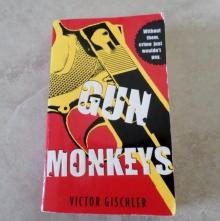 Gun Monkeys
Gun Monkeys Go-Go Girls of the Apocalypse
Go-Go Girls of the Apocalypse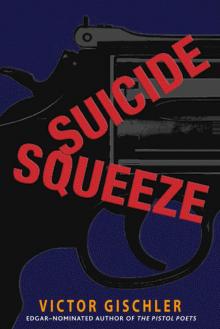 Suicide Squeeze
Suicide Squeeze The Pistol Poets
The Pistol Poets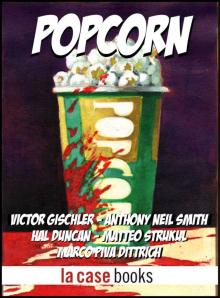 POPCORN
POPCORN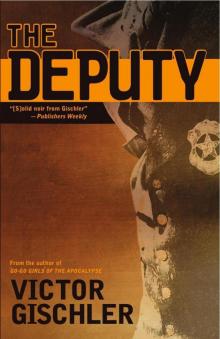 The Deputy
The Deputy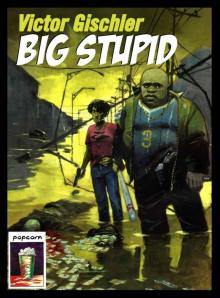 Big Stupid (POPCORN)
Big Stupid (POPCORN) Pistol Poets
Pistol Poets Shotgun Opera
Shotgun Opera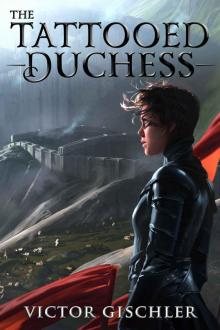 The Tattooed Duchess (A Fire Beneath the Skin Book 2)
The Tattooed Duchess (A Fire Beneath the Skin Book 2) Ink Mage
Ink Mage Go-Go Girls of the Apocalypse: A Novel
Go-Go Girls of the Apocalypse: A Novel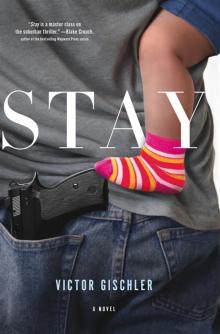 Stay
Stay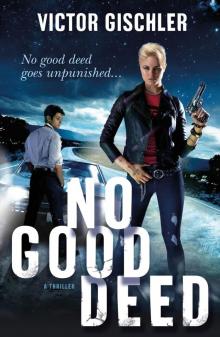 No Good Deed
No Good Deed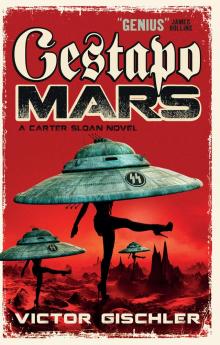 Gestapo Mars
Gestapo Mars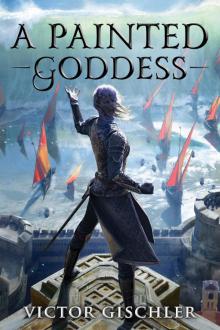 A Painted Goddess
A Painted Goddess